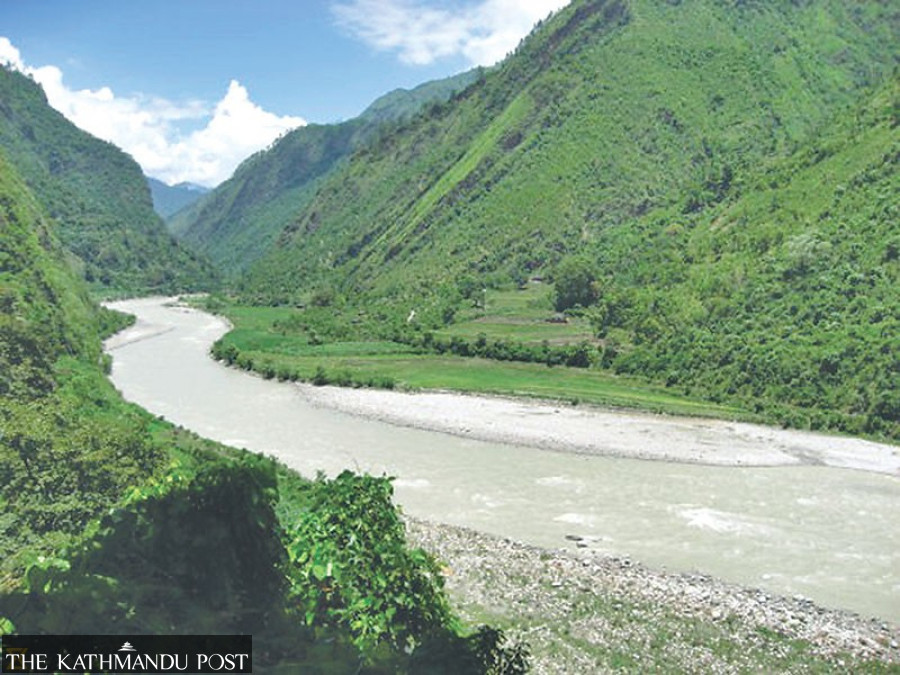National
Investment Board, India’s NHPC Limited to ink MoU on West Seti projects Thursday
The Indian state-owned company got the nod to study and build 1,200MW projects last week.
Anil Giri
The Investment Board Nepal and India’s state-owned NHPC Limited are set to sign a memorandum of understanding (MoU) on Thursday to develop the West Seti and Seti River-2 hydroelectric projects in western Nepal.
The signing of the MoU will pave the way for the NHPC to carry out the project study, hydrological study in two rivers, geo-technical survey, and drilling work among other things before starting the construction work, officials said.
Amrit Lamsal, spokesperson for the Investment Board Nepal, told the Post that an NHPC team is arriving in Kathmandu on August 18 to sign the MoU.
Sushil Bhatta, IBN chief executive officer, and Abhay Kumar Singh, chairman and managing director of the NHPC Limited, will sign the agreement.
Last Monday, a board meeting of the Investment Board Nepal, chaired by Prime Minister Sher Bahadur Deuba, approved the NHPC proposal to study and develop the 750MW West Seti Storage Hydropower Project and 450MW Seti River-6 Hydropower Project in Sudurpaschim Province.
“NHPC Limited is expected to complete the study in two years,” said Lamsal. “The IBN will facilitate the study.”
Both are storage type projects.
The NHPC Limited, an Indian government hydropower board under India’s Ministry of Power, had submitted a proposal in May to develop the projects.
The new project sites are located at elevations ranging from 550 to 920 metres and are spread across six districts.
The estimated cost of the project, according to the Investment Board, is $2.4 billion.
As Nepal and India are seeking to increase cooperation in the hydropower sector lately, the Indian state-owned company came up with the proposal to develop the projects.
This is the third Indian venture and investment in Nepal’s hydropower sector. Another Indian state-owned company, the SJVN Limited is developing the 900MW Arun 3 project and was awarded the Lower Arun project in July last year. The installed capacity of Lower Arun will be 679 megawatts. India’s private-sector company, the GMR, is building the Upper Karnali Hydro Electricity project located between Achham, Dailekh and Surkhet districts but the company has been struggling to generate required funds.
After the GMR repeatedly failed to generate funds to develop the 900 megawatts projects, a cabinet meeting in July this year gave the company an additional two years to complete the financial management of the project awarded in 2008.
While awarding the West Seti and SR-2 projects to the NHPC Limited, some leaders had raised concerns that the government did not opt for a competitive bidding process.
But Lamsal said that earlier the government had invited competitive bids, but the firm selected and awarded the project failed to start the work on time.
“As per the Public Private Partnership and Investment Act, we have selected the NHPC Limited after examining its proposal thoroughly. Since West Seti is a national priority project, we have no other option than to expedite it. Not all projects require a competitive bidding process and as per the act, we can award the contract through negotiations also,” said Lamsal.
“After all past attempts to build the project through different models failed, we have decided to award both the projects to the NHPC after studying the company’s track record as well as to ensure energy export.”
The development comes after Nepal and India in early April issued a joint vision statement on energy, which talks about expanding mutually beneficial bilateral cooperation in the power sector including joint development of power generation projects in Nepal; development of cross-border transmission infrastructure; bi-directional power trade with appropriate access to electricity markets in both countries based on mutual benefits, market demand and applicable domestic regulations of each country; coordinated operation of national grids; and institutional cooperation in sharing latest operational information, technology and know-how.
India’s state-owned companies have been more active and willing to develop hydropower projects in Nepal lately.
Successive governments in the past awarded the construction of the West Seti project to Australian and Chinese companies but they failed to execute the project so some experts said that selection of NHPC Limited for West Seti and SR-2 is a good choice.
Anup Kumar Upadhyay, former water resources secretary, said that allowing the NHPC Limited to build West Seti, along with SR-2, is a good decision in the present context because this is among few companies that are financially strong, technically sound and able to sell energy to the India market.
“If NHPC Limited itself does not want to build the projects, that’s a different case, otherwise the selection is good. As far as why a competitive bidding process was not followed, this is not an appropriate question to ask because Nepali agencies have already experienced it and we failed too,” Upadhyay told the Post.
“The need of the hour is swift construction of the projects and assurance of energy trading with good financial and technical expertise. In that context, the NHPC Limited is capable of that.”




 20.12°C Kathmandu
20.12°C Kathmandu















